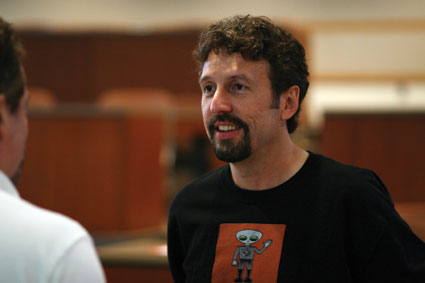Theater Professor Michael Abbott '85 started The Brainy Gamer "to create a friendly place for thoughtful conversation about video games." Three years and almost three million page views later, The Brainy Gamer to mark the milestone he's produdest of—almost 12,000 reader comments—with a reflection on the project and the community of students, teachers, designers, and critics that has formed around it.

When I started The Brainy Gamer three years ago, I wanted to create a friendly place for thoughtful conversation about video games. At the time, it wasn’t clear to me that an audience for such a conversation existed, but I decided to dive in anyway and hope for the best. Wabash taught me the value of undaunted behavior many moons ago.
I began writing about games I was playing—mostly story-driven games with larger-than-life characters and exotic settings—and I initially focused on the connecting points between this emerging new art form and more established media like theater and film.
In my first week online, 37 people visited my site, including one from Uzbekistan. I was off and running.
Slowly the site gained traction, and my podcast audience grew. As my field of vision widened to include games off the beaten path, I began to see that I needed to re-think my approach. My background in theater and film made it easy for me to see games as a natural extension of those modes of expression, but such a view was needlessly constraining. Ambitious new games like Bioshock, Fallout 3, and Portal were arriving on the scene, and they filled our plates with thematic, ludic, and design issues unique to an interactive digital medium. I had arrived on the scene at a pivotal moment in the history of video games.
Games had grown up, and it was time to write about them with critical purpose.
I soon began forging relationships with game designers, critics, and journalists. I traveled to the Game Developers Conference, the Games for Change Confer-ence, the Games, Learning, and Society Conference, and many other events. At each of these gatherings, I met incredibly creative people pushing the industry forward and forcing us to reconsider our ideas about who plays games, why we play them, and how they can communicate meaning. I brought many of these ideas back to Wabash with me, and they have informed my teaching and transformed my thinking about pedagogy.
Our mainstream media paints a hopelessly outmoded picture of video games. Certainly, shooter games like the Call of Duty series and sports simulators like the Madden series sell millions of copies; but they account for only a tiny fraction of the games released each year. Small developers and indie studios are making games that address many of the big questions we routinely explore in the liberal arts. The interactive nature of games presents an extraordinary opportunity for us to engage with these issues head-on, making choices that affect outcomes and empathetically walking in the shoes of other people.
It’s one thing to read a news story about poverty and hunger. It’s quite another to assume the role of a young girl living in Darfur who must choose between going to school and finding food for her family. Video games provide a distinctive, first-person way of seeing the world. At their best, they enable a powerful, and even transformative form of engagement.
Through many conversations with readers, I’ve learned that part of my project with The Brainy Gamer is to model civil discourse in an online environment that can be hostile and dismissive. This has grown more challenging as my site traffic has increased, and I haven’t always succeeded at keeping the trolls at bay, but my readers always find ways to keep the conversation constructive. The community that’s formed around my blog is the most gratifying outcome of this whole project for me. Nearly every day I learn something, reconsider an opinion, or simply make a connection with someone who feels as invested in the future of games as I do.
It’s exhilarating to think that we come together from all parts of the globe to help advance the case for games. Everyone is at this table: teachers, students, designers, critics—we’re all part of this conversation, and I believe we’re making a difference.
The students I teach today have no memory of a world without video games. I’m a small part of a big effort to make games worthy of their studious attention.
